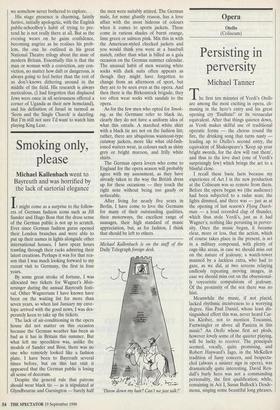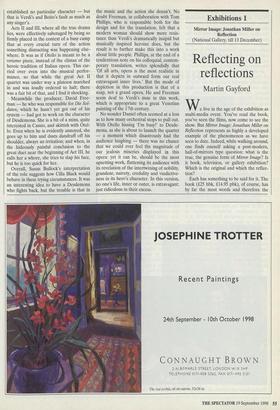Opera
Otello (Coliseum)
Persisting in perversity
Michael Tanner
The first ten minutes of Verdi's Otello are among the most exciting in opera, cli- maxing in the hero's entry and his great opening cry 'Esultate or its vernacular equivalent. After that things quieten down, as Verdi makes skilful use of traditional operatic forms — the chorus round the fire, the drinking song that turns nasty leading up to Otello's second entry, the equivalent of Shakespeare's 'Keep up your bright swords, for the dew will rust them', and thus to the love duet (one of Verdi's surprisingly few) which brings the act to a blissful close.
I recall these basic facts because my experience of Act I in the new production at the Coliseum was so remote from them. Before the opera began we (the audience) had been subjected to a radar scan; the lights dimmed, and there was — just as at the opening of last season's Flying Dutch- man — a loud recorded clap of thunder, which thus stole Verdi's, just as it had Wagner's; nothing like persisting in perver- sity. Once the music began, it became clear, more or less, that the action, which of course takes place in the present, is set in a military compound, with plenty of cage-like areas, in case we should miss out on the nature of jealousy; a watch-tower manned by a luckless extra, who had to gaze, as we did, at two screens relaying endlessly repeating moving images, in case we should miss out on the obsessional- ly voyeuristic compulsions of jealousy. Of the proximity of the sea there was no hint.
Meanwhile the music, if not placid, lacked rhythmic incisiveness to a worrying degree. Has Paul Daniel, whose least dis- tinguished effort this was, never heard Car- los Kleiber, not to mention Toscanini, Furtwangler or above all Panizza in this music? An Otello whose first act plods, however lovely some of the quieter playing, will be lucky to recover. The principals seemed, vocally, quite promising, and Robert Hayward's Iago, in the McKellen tradition of fussy concern, and bespecta- cled (always a sinister sign in opera), was dramatically quite interesting. David Ren- dall's burly hero was not a commanding personality, the first qualification; while, remaining in Act I, Susan Bullock's Desde- mona, singing some beautiful long phrases, established no particular character — but that is Verdi's and Boito's fault as much as any singer's.
Acts II and III, where all the true drama lies, were effectively sabotaged by being so firmly placed in the context of a busy camp that at every crucial turn of the action something distracting was happening else- where. It was as if Otello is meant to be a verismo piece, instead of the climax of the heroic tradition of Italian opera. This car- ried over even into the musical perfor- mance, so that while the great Act II quartet was under way a platoon marched in and was loudly ordered to halt; there was a fair bit of that, and I find it shocking.
Meanwhile the producer, David Free- man — he who was responsible for Die Sol- daten, which he hasn't yet got out of his system — had got to work on the character of Desdemona. She is a bit of a minx, quite interested in Cassio, and skittish with Otel- lo. Even when he is evidently annoyed, she goes up to him and dusts dandruff off his shoulder, always an irritation; and when, in the hideously painful conclusion to the great duet near the beginning of Act III, he calls her a whore, she tries to slap his face, but he is too quick for her.
Overall, Susan Bullock's interpretation of the role suggests how Cilla Black would behave in these trying circumstances. It was an interesting idea to have a Desdemona who fights back, but the trouble is that in the music and the action she doesn't. No doubt Freeman, in collaboration with Tom Phillips, who is responsible both for the design and for the translation, felt that a modern woman should show more resis- tance than Verdi's dramatically insipid but musically inspired heroine does, but the result is to further make this into a work about little people. Phillips, at the end of a tendentious note on his colloquial, contem- porary translation, writes splendidly that `Of all arts, opera is the most realistic in that it depicts in outward form our real extravagant inner lives.' But the mode of depiction in this production is that of a soap, not a grand opera. He and Freeman seem deaf to Verdi's tinta in this work, which is appropriate to a great Venetian painting of the 17th century.
No wonder Daniel often seemed at a loss as to how many orchestral stops to pull out. With Otello hissing 'I'm busy!' to Desde- mona, as she is about to launch the quartet — a moment which disastrously had the audience laughing — there was no chance that we could ever feel the magnitude of our jealous miseries displayed ip this opera: yet it can be, should be the most upsetting work, flattening its audience with its revelation of the intertwining of nobility, grandeur, naivety, credulity and vindictive- ness in its hero's character. In this version, no one's life, inner or outer, is extravagant; just ridiculous in their excess.











































































 Previous page
Previous page